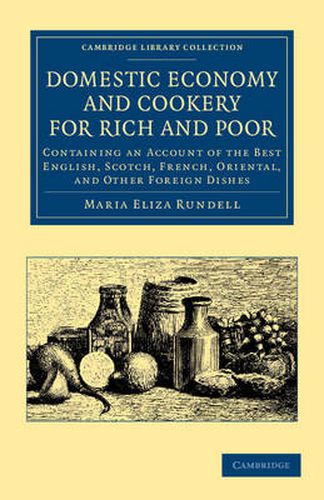Readings Newsletter
Become a Readings Member to make your shopping experience even easier.
Sign in or sign up for free!
You’re not far away from qualifying for FREE standard shipping within Australia
You’ve qualified for FREE standard shipping within Australia
The cart is loading…






Maria Eliza Rundell (1745-1828) was a phenomenally successful cookery writer. Originally compiled for her daughters, the first edition of this work was published in 1806, with improved and illustrated editions following regularly. It became one of publisher John Murray’s chief assets, but after legal disputes between author and publisher over the profits, Rundell transferred the work to Longman in 1821; by 1849 it had reached its 73rd edition. The 1827 edition is reissued here. The book was the first manual of household management which aimed at completeness, including advice on servants, shopping with economy and attention to seasonal food, hygiene, and nutrition for children and invalids. It was much imitated, although apparently not used as a source by Mrs Beeton. It is surprisingly cosmopolitan, including French, German, Turkish and Indian recipes, and is a fascinating source for social historians on standards of living and fashions in food and entertaining.
$9.00 standard shipping within Australia
FREE standard shipping within Australia for orders over $100.00
Express & International shipping calculated at checkout
Maria Eliza Rundell (1745-1828) was a phenomenally successful cookery writer. Originally compiled for her daughters, the first edition of this work was published in 1806, with improved and illustrated editions following regularly. It became one of publisher John Murray’s chief assets, but after legal disputes between author and publisher over the profits, Rundell transferred the work to Longman in 1821; by 1849 it had reached its 73rd edition. The 1827 edition is reissued here. The book was the first manual of household management which aimed at completeness, including advice on servants, shopping with economy and attention to seasonal food, hygiene, and nutrition for children and invalids. It was much imitated, although apparently not used as a source by Mrs Beeton. It is surprisingly cosmopolitan, including French, German, Turkish and Indian recipes, and is a fascinating source for social historians on standards of living and fashions in food and entertaining.